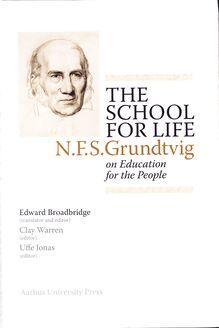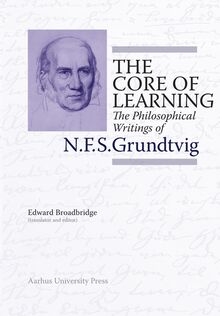-
 Univers
Univers
-
 Ebooks
Ebooks
-
 Livres audio
Livres audio
-
 Presse
Presse
-
 Podcasts
Podcasts
-
 BD
BD
-
 Documents
Documents
-
- Cours
- Révisions
- Ressources pédagogiques
- Sciences de l’éducation
- Manuels scolaires
- Langues
- Travaux de classe
- Annales de BEP
- Etudes supérieures
- Maternelle et primaire
- Fiches de lecture
- Orientation scolaire
- Méthodologie
- Corrigés de devoir
- Annales d’examens et concours
- Annales du bac
- Annales du brevet
- Rapports de stage
La lecture à portée de main
Vous pourrez modifier la taille du texte de cet ouvrage
Découvre YouScribe en t'inscrivant gratuitement
Je m'inscrisDécouvre YouScribe en t'inscrivant gratuitement
Je m'inscrisEn savoir plus
Vous pourrez modifier la taille du texte de cet ouvrage
En savoir plus

Description
As part of its agenda to digitalise and translate Grundtvig’s vast output, the Grundtvig Study Centre at Aarhus University is pleased to publish this fifth volume in the series, ‘N.F.S. Grundtvig: Works in English’. Volume 1, The School for Life (2011), contains Grundtvig’s major writings on education, while Volume 2, Living Wellsprings (2015) contains a selection of his hymns, songs, and poems. Volume 3, Human Comes First (2018) contains articles and sermons relating to Grundtvig’s Christian theology, and Volume 4, The Common Good (2019) deals with his historical and political ideas.
Sujets
Informations
| Publié par | Aarhus University Press |
| Date de parution | 13 août 2021 |
| Nombre de lectures | 0 |
| EAN13 | 9788772195728 |
| Langue | English |
Informations légales : prix de location à la page 0,2300€. Cette information est donnée uniquement à titre indicatif conformément à la législation en vigueur.
Extrait
THE CORE OF LEARNING
The Philosophical Writings of N.F.S. Grundtvig
Edward Broadbridge (translator and editor)
Introduction: Kim Arne Pedersen & Anders Holm Afterword: Anders Holm
Introductions by Niels W. Bruun, Kim Arne Pedersen, Kim Steen Ravn, Jon Tafdrup, Vanja Thaulow, Steen Tullberg
Philosophy is an expression of the human endeavour for wisdom (1816)
Philosophising without Faith is the same as looking without eyes (1817)
Aarhus University Press |
The Core of Learning. The Philosophical Writings of N.F.S. Grundtvig
Edward Broadbridge and Aarhus University Press
Illustrations selected and annotated by Edward Broadbridge
Language Consultant: Hanna Broadbridge
Typeset by Narayana Press
Cover design by J rgen Sparre
E-book production: Narayana Press
A recording of all the texts is available free at www.unipress.dk
This book is number five in the series N.F.S. Grundtvig: Works in English
Series editors:
Niels Henrik Gregersen, Ove Korsgaard
ISBN 978 87 7219 572 8 (epub)
ISSN 2246-7025
Published:
vol. 1. The School For Life. N.F.S. Grundtvig on Education for the People (2011)
vol. 2. Living Wellsprings. The Hymns, Songs, and Poems of N.F.S. Grundtvig (2015)
vol. 3. Human Comes First. The Christian Theology of N.F.S. Grundtvig (2018)
vol. 4. The Common Good. N.F.S. Grundtvig as Politician and Contemporary Historian (2019)
vol. 5. The Core of Learning. The Philosophical Writings of N.F.S. Grundtvig (2021)
vol. 6. Denmark s Catalyst. The Life and Letters of N.F.S. Grundtvig (2022)
Published with the financial support of Danish foundations. For a full list see p. 10
Aarhus University Press
Finlandsgade 29
8200 Aarhus N
Denmark
www.unipress.dk
INTERNATIONAL DISTRIBUTORS
Oxbow Books Ltd.
The Old Music Hall
106-108 Cowley Road
Oxford, OX4 1JE
United Kingdom
www.oxbowbooks.com
ISD
70 Enterprise Drive, Suite 2
Bristol, CT 06010
USA
www.isdistribution.com
Contents
Illustrations
Foreword
Katrine Fr kj r Baunvig
Editor s/Translator s Note
Edward Broadbridge
Notes on Contributors
Time will Tell the Truth : Grundtvig as a Philosopher
Kim Arne Pedersen & Anders Holm
I ANTHROPOLOGY AND METAPHYSICS
1. On Human Beings in the World (1817)
Introduction by Steen Tullberg
2. On Truth, Greatness, and Beauty (1817)
Introduction by Kim Arne Pedersen
II RELIGION AND AESTHETICS
3. On Religion and Liturgy (1807)
Introduction by Vanja Thaulow
4. On Revelation, Art, and Learning (1817)
Introduction by Jon Tafdrup
5. On the Church, the State, and the School, part 2 (1819)
Introduction by Kim Arne Pedersen
III HISTORY AND SIGNS
6. On the Advancement of Learning (1807)
Introduction by Niels W. Bruun
7. On the Philosophical Century (1816)
Introduction by Steen Tullberg
8. On Historical Learning, or the Concept of History (1816)
Introduction by Jon Tafdrup
9. On the Relation between Learning, Experience, and Sound Common Sense (1817)
Introduction by Steen Tullberg
10. History and Naturalism, or the Illumination of Time and Space (1865)
Introduction by Kim Arne Pedersen
IV LANGUAGE
11. On Proverbs (1817)
Introduction by Kim Steen Ravn
12. On the Word and the Mother-Tongue (1819)
Introduction by Kim Arne Pedersen
V YOUTH
13. Youth in Our Time (1850)
Introduction by Kim Arne Pedersen
14. Three Speeches at Marielyst People s High School (1866, 1868, 1871)
Introduction by Edward Broadbridge
AFTERWORD GRUNDTVIG AND KIERKEGAARD
The Yodeler and the Hairsplitter. On the Enigmatic Relationship between Grundtvig and Kierkegaard
Anders Holm
Sources
English Bibliography
Indexes
N. F. S. Grundtvig: Works in English
Translated and edited by Edward Broadbridge
Published by Aarhus University Press
Illustrations
Cover: P.C. Skovgaard s drawing of Grundtvig. The handwriting is Grundtvig s own, taken from Illustration 3.
1. Grundtvig 1822 Copper engraving by Johann Walther. Royal Library, Copenhagen
2. The lightning-man, Henrik Steffens 1813 Painting 1891 by Arthur Kampf
3. Draft manuscript for On Human Beings in the World 1814-15 Royal Library, Copenhagen
4. Front cover of first edition of Danne-Virke 1816 Photo: Edward Broadbridge
5. Contents of last edition of Danne-Virke 1819 Photo: Edward Broadbridge
6. Grundtvig 1842 Drawing 1842 by Peter (P.C.) Skovgaard
7. Grundtvig s study at Store Tuborg Illustreret Tidende 1883, Royal Library, Copenhagen
8. Grundtvig s memorial rooms at Udby Photo: Leif Tuxen
9. First page of Youth in Our Time 1850 Photo: Edward Broadbridge
10. Grundtvig in his velvet gown 1872 Photo: Adolph L nberg, Royal Library, Copenhagen
11. Ernst Trier speaking at Vallekilde People s High School 1888 Drawing by Joakim Skovgaard, Det Nationalhistoriske Museum p Frederiksborg Slot. Photo: Kit Weiss
12. Flyer for course on Kierkegaard and Grundtvig Photo: Edward Broadbridge
Foreword
Katrine Fr kj r Baunvig
N.F.S. Grundtvig (1783-1872) is a founding father of Danish democracy and a church father within the Evangelical Lutheran Church in Denmark. Furthermore, he is the architect behind the modern-day Danish school system as well as a romantic reviver and scholar of pre-Christian Nordic religion. This at least is the mainstream, self-reaffirming representation of Grundtvig s life, work, and cultural imprint dominating public discourse in Denmark anno 2021. Remarkably, this widely distributed representation leaves out entirely the important strands of philosophical reflection nested within the body of Grundtvig s works. The present volume seeks to take the first steps in making up for this situation. This is the first ever to gather Grundtvig s most important philosophical works in a single volume.
The Core of Learning is the fifth in a series of six translations of Grundtvig s work into English. The School for Life , containing a group of Grundtvig s texts on educational ideas, was published in 2011; Living Wellsprings , offering a sample of Grundtvig s vast number of hymns, songs and poems, was published in 2015; Human Comes First , comprising highlights of Grundtvig s theological writing, was published in 2018; and The Common Good , containing a group of Grundtvig s political writings and writings on contemporary history, was published in 2019. Forthcoming is volume 6, a biography and translations of 60 or so of Grundtvig s letters.
The Grundtvig Study Centre at Aarhus University is the instigator of these translations. The series is an extension of the centre s ongoing critical edition of Grundtvig s Works (in Danish) as they were published in his lifetime; see www.grundtvigsvaerker.dk . The Centre undertakes and supports research focusing on all areas of interest in Grundtvig studies, including comparative research initiatives that offer new perspectives on Grundtvig s work and the reception hereof. Furthermore, the centre fosters and supports knowledge exchange, teaching in, and dissemination of this research.
The texts for The Core of Learning have been selected by a committee comprising, in alphabetical order: Edward Broadbridge, Niels Henrik Gregersen, Hans Raun Iversen, Uffe Jonas, Ove Korsgaard, Michael Schelde, and Ole Vind.
Kim Arne Pedersen and Anders Holm are the authors of the comprehensive introduction to Grundtvig as a philosopher covering the stages in his philosophical reflection and the (overlooked) reception of it.
Members of the staff of www.grundtvigsvaerker.dk - Steen Tullberg, Jon Tafdrup, Kim Steen Ravn, Vanja Thaulow - as well as Kim Arne Pedersen, Niels W. Bruun and Edward Broadbridge have generously offered their expertise in aiding the individual Grundtvig texts with introductions; Anders Holm has contributed with a rich afterword on the enigmatic relationship between Grundtvig and his contemporary, S ren Kierkegaard.
As with the previous volumes in the series, Edward Broadbridge has been responsible for the translations and editing of the book. The language consultant has been Hanna Broadbridge.
This publication has received financial support from the following foundations, whom the Grundtvig Study Centre cordially thanks:
Aarhus Universitets Forskningsfond
Svend Grundtvig & Axel Olriks Legat
N. F. S. Grundtvigs Fond
Carlsen-Langes Legatstiftelse
Katrine Fr kj r Baunvig ,
Director of the Grundtvig Study Centre, Aarhus University
Editor s/Translator s Note
Edward Broadbridge
Grundtvig is both a philosophical theologian and a theological philosopher, which means that certain articles could have been placed either in vol. 3 on Theology or, as here, in vol. 5 on Philosophy. One such is On Religion and Liturgy , which appears here because the first quarter, What is religion is decisively philosophical in tone, and the liturgy takes up only the last part of the article.
Grundtvig s Philosophy of Education
Readers who are interested in this particular aspect of Grundtvig are referred to the illuminating essay by Ove Korsgaard in vol. 1 in the series, The School for Life (2011) pp. 13-35. Its very title, Grundtvig s Philosophy of Enlightenment and Education makes the salient point that a single Danish word, oplysning (lit. uplighting ), includes both these aspects. Education is not fully education unless it also creates enlightenment, i.e. insight. The last two chapters in this book, an essay and three speeches of Grundtvig s, bring this translation series back to its outset in the School for Life. Outside Denmark, Grundtvig is primarily known for his educational ideas. Inside Denmark these vie for influence with his hymns and songs.
Paragraph length
On Human Beings in the World begins with a single paragraph of 1,296 words. In the original edition from 1817 this runs to 6 pages without a paragraph break . But this is small beer compared to Paragraph 11, which in the original Gothic script runs to 2,685 words, (pp. 143-56) without a break. The translation makes room for 13 paragraphs for this single unsparing block of words.
Use of italics
During h
-
 Univers
Univers
-
 Ebooks
Ebooks
-
 Livres audio
Livres audio
-
 Presse
Presse
-
 Podcasts
Podcasts
-
 BD
BD
-
 Documents
Documents
-
Jeunesse
-
Littérature
-
Ressources professionnelles
-
Santé et bien-être
-
Savoirs
-
Education
-
Loisirs et hobbies
-
Art, musique et cinéma
-
Actualité et débat de société
-
Jeunesse
-
Littérature
-
Ressources professionnelles
-
Santé et bien-être
-
Savoirs
-
Education
-
Loisirs et hobbies
-
Art, musique et cinéma
-
Actualité et débat de société
-
Actualités
-
Lifestyle
-
Presse jeunesse
-
Presse professionnelle
-
Pratique
-
Presse sportive
-
Presse internationale
-
Culture & Médias
-
Action et Aventures
-
Science-fiction et Fantasy
-
Société
-
Jeunesse
-
Littérature
-
Ressources professionnelles
-
Santé et bien-être
-
Savoirs
-
Education
-
Loisirs et hobbies
-
Art, musique et cinéma
-
Actualité et débat de société
- Cours
- Révisions
- Ressources pédagogiques
- Sciences de l’éducation
- Manuels scolaires
- Langues
- Travaux de classe
- Annales de BEP
- Etudes supérieures
- Maternelle et primaire
- Fiches de lecture
- Orientation scolaire
- Méthodologie
- Corrigés de devoir
- Annales d’examens et concours
- Annales du bac
- Annales du brevet
- Rapports de stage









